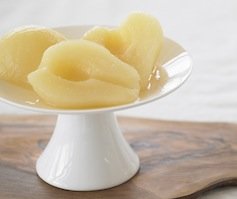Inventory and demand of canned pear products appear to be in balance.
The Pacific Northwest canned pear industry is in a good position right now, based on inventory, pricing, demand, and import trends. The positive outlook for the coming season was reflected in the upbeat mood of pear growers and processors attending the annual meeting of the Washington-Oregon Canning Pear Association held yesterday (February 19, 2013) in Yakima, Washington.
The past year brought several changes to the Northwest processed pear industry, says Jay Grandy of the Washington-Oregon Canning Pear Association. Processing facilities closed, changed hands, and what now remains are three cash buyers for Northwest pears.
The processing assets of the grower cooperative Snokist Growers were sold through bankruptcy court last May to Del Monte Foods and Pacific Coast Producers. Del Monte already had a pear processing plant in Yakima, so the purchase eliminated a buyer of Northwest pears. Later in the year, Truitt Brothers, Inc., closed its canning pear operation in Salem, Oregon, further consolidating the pear processing industry. Just a month ago, Seneca Foods Corporation, one of the world’s leading producers of canned vegetables, announced purchase of Independent Foods, LLC, the last locally owned pear, apple, and cherry processor in the Yakima Valley. The third Northwest pear processor is Northwest Packing Company of Vancouver, Washington.
More than 128,300 tons of Bartlett pears were processed in the Northwest last year, down from nearly 139,400 tons processed in 2011, reported Grandy. In recent years, Northwest Bartlett processed tonnage has declined—the 2012 amount was about 50,000 tons less than 183,000 tons of pears handled by Northwest processors in 2006.
Quality of fruit in 2012 was very good, said
, adding that size was very good and fruit picked very clean. He cautioned that yields could be down for 2013 due to heavy pruning for fireblight in some orchards.
Strong prices
Another good sign for the industry is pricing. Prices for canned pears sold to the U.S. Department of Agriculture have been slowly climbing and improving the last few years, Grandy said. The most recent published USDA prices were around $27 per case in 2012. Grandy explained that the USDA is an important buyer of canned pears, purchasing around 1 million cases each year. Ten to 15 percent of the total pear pack is annually sold to USDA for the school lunch and other food programs. He noted that published USDA bid prices are more accurate than prices reported by processors because they don’t include discounting and other price differentials.
Canned pear inventory reported by the processors for the end of 2012 was below previous years, Grandy said, which is another positive. Inventories reported are used internally by the association and not publicly released, he added.
“The canned pear industry is in a good position,” he said. “Sales are happening, the pack is down, and inventory is moving. Inventory is in a much more favorable position than in past years, and it’s been staying in a good position.”
Imports have stabilized
Moreover, import trends of canned pears are more favorable to U.S. pear producers than five years ago. “Import of canned pears has stabilized in recent years,” he said, adding that canned pear imports reached a peak of about 2 million case equivalents in 2008. Since then, imports have stayed around 1.2 to 1.5 million cases. China is the biggest canned pear importer, responsible for about 1.1 to 1.2 million cases, according to Grandy, with the balance coming from Thailand, South Africa, and Australia.
The Canning Pear Association, created in the mid-1950s, is a voluntary organization charged with negotiating prices for Northwest Bartlett pears with processors. At one time, the bargaining association worked with more than a dozen processors. Today, there are three canners in the Northwest and two in California.
The association negotiated new prices last spring with Del Monte and Northwest Packing that will be effective through 2014. Grandy is hopeful that Seneca Foods will also agree to the negotiated prices. The price for #1 grade in 2012 was $260 per ton. The #1 price will increase to $266 per ton in 2013 and $272 in 2014.



Leave A Comment